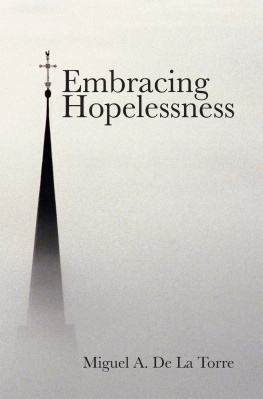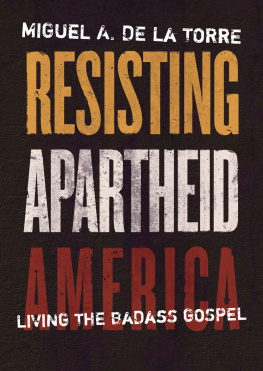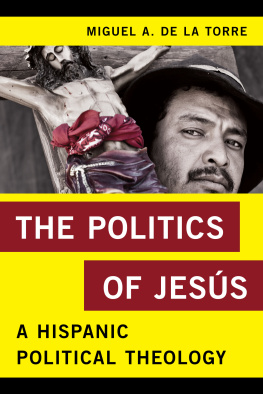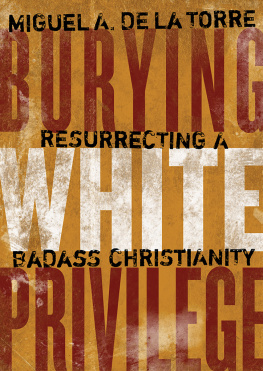Embracing Hopelessness
Miguel A. De La Torre
Fortress Press
Minneapolis
EMBRACING HOPELESSNESS
Copyright 2017 Fortress Press. All rights reserved. Except for brief quotations in critical articles or reviews, no part of this book may be reproduced in any manner without prior written permission from the publisher. Email copyright@1517.media or write to Permissions, Fortress Press, PO Box 1209, Minneapolis, MN 55440-1209.
Cover image: Thinkstock: 126401302/sodapix sodapix/
Cover design: Lauren Osman
Print ISBN: 978-1-5064-3341-7
eBook ISBN: 978-1-5064-3342-4
The paper used in this publication meets the minimum requirements of American National Standard for Information Sciences Permanence of Paper for Printed Library Materials, ANSI Z329.48-1984.
Manufactured in the U.S.A.
This book was produced using Pressbooks.com, and PDF rendering was done by
PrinceXML.
TO:
Tink
in celebration of his 2018 retirement
and the decades of shaping minds
including this authors
Contents
In an earlier book (The U.S. Immigration Crisis: Toward an Ethics of Place), I made an argument for an ethics of place, a perspective influenced by Clodovis Boffs five-month missionary journey through the remote jungles of Western Brazil. His book Feet-on-the-Ground Theology records conversation with the rubber gatherers he encounters while ministering to their needs. To do theological reflection requires sharing in the lives, the hardships, the pain, and the concerns of those forced to exist on the margins of power and privilege. To engage in liberative ethical analysis requires accompanying the oppressed in their struggles; leaving the safety of ivory towers to occupy precarious spaces alongside the disenfranchised. In short, one must be Presente! To be present moves away from theorizing about the oppressed as if they are simply some object upon which to gaze. An ethics of place recognizes the physical location where the oppressed reside as being crucial in understanding which ethics, which praxis, needs to be engaged. Not to be presente questions the ability to truly comprehend the dilemma under investigation. Physically engaging in consciousness-raising praxis provides a better understanding concerning the causes of oppression and how they are manifested in the everyday, facilitating better-informed theories or doctrines. In the doing of liberative acts (ethics), theory (theology) is formed as a reflection of praxis.
To that end, I made it a point to physically go to where oppression has and/or continues to exist. In reality, I could have picked any number of atrocities where everyday lives have been crushed under the grindstone of history: child soldiers, the US gun epidemic, sex trafficking, clergy rape of children. Locales and topics chosen were, to some extent, arbitrary. Realizing that a multiple number of atrocities exist from which to bear testimony to the hopelessness of human existence, I did not visit these randomly chosen locales of oppression solo. I asked fellow scholars to accompany me in my journey with their conversation and insight. Because the focus of my research (unlike the previous two books in this trilogy) moves beyond the US Latinx experience, I initiated conversations with individuals of different races, ethnicities, and religious persuasions. And while my focus remains rooted in my own Christian faith, I reached out to non-Christians to hold me accountable, in an attempt to safeguard me from normalizing my reality. As I was writing each chapter, I was in dialogue with my conversation partner, and upon completing the chapter, I shared my writing to obtain additional insights, critiques, and feedback. In a very real way, this book is a product of what Latinx scholars call a teologa de conjunto (also known as a teologa en conjunto).
The term teologa de conjunto translates as doing theology in conjunction, or jointly. To engage in a teologa de conjunto is to employ a communal methodology of theorizing characteristic of the US Latinx theological movement. This approach originates in and reflects upon the lived reality of marginalized communities and involves a process by which scholars, ministers, and laypersons gather and reflect together. But if truth be known, all too often Latinx scholars edit an anthology by asking different scholars to write individual chapters, seldom discussing their thoughts and writings, and having minimal connection to others writing their own individual chapters for the same volume. Few actually take the time to engage and wrestle with each others thoughts when theorizing theological and ethical concepts. All too often, the only difference between a Latinx-edited book and a Eurocentric-edited book is that the former refers to their edited volume as a teologa de conjunto. But a teologa de conjunto must mean more than what Euroamericans also do; it must encompass the give-and-take of discourse during the writing project. The methodology employed in writing this particular book was an attempt to capture the spirit of what Latinx originally meant by the term teologa de conjunto, while expanding the Latinx-centric methodology to include those of different ethnic, racial, and religious traditions. To that end, I am deeply grateful to the following scholars for agreeing to challenge my thinking and be my conversation partners:
Chapter 1 Grace Ji-Sun Kim, a Korean Christian
Chapter 2 George Tink Tinker, a Native American
Chapters 1 & 2 Albert Hernndez, a Latinx historian
Chapter 3 Santiago Slabodsky, a Latin American Jew
Chapter 4 Stacey Floyd-Thomas, a womanist
Chapter 5 John Fife, a Euroamerican Christian minister.
To all of them, who made this final book of my trilogy possible: Muchisima Gracias!
- I am aware that scholars such as Mick Smith have used the term ethics of place as a means by which to reengage the moral and ethical concerns of radical ecological theories; that J. K. Gibson Graham uses the term ethics of the local in a Marxist analysis grounded in the necessary failure of the global order; and that John Inge uses the term theology of place to stress taking seriously the importance of place and how it contributes to the creation of the identity of community and vice versa, with both endangered by the effects of globalization responsible for the erosion of peoples rootedness. I am using the phrase ethics of place somewhat differently than how others have used the term. For me, an ethics of place means praxis must be developed in the place of oppression, in the midst of the effects of institutionalized disenfranchisement, in the hope of creating an ethical response. When I use the term ethics of place, I mean that ethical analysis, to be contextual, must also pay close attention to the physical locale of the marginalized.
Preface: The Order of Things
For the traditionalist thinker, this book might very well be considered the first of a trilogy, even though the other two books have already been published. But those who engage in liberative ethics will have no difficulty in seeing this book as the third and final installment. In Latina/o Social Ethics: Moving Beyond Eurocentric Moral Thinking (Baylor University Press, 2010), I focused on praxis, the doing of ethics; while in The Politics of Jess (Rowman & Littlefield, 2015), I explored the biblical text to understand the praxis advocated in the first book. In this third book, I turn to theological and theoretical understandings based on the praxis employed in the first book and the biblical witness given by the second book. Hence, the correct order of things: from action flows understanding. This methodology differs radically from the way Eurocentric thought has been constructed: normativity conducted deductively. From some theology or theory (or truth) comes the action (or praxis) done to remain faithful to what is already believed and decided. First comes some conceptualized universal truth, such as an ideology, a philosophy, a biblical interpretation, or a church teaching. Then, based on this truth, an actionas a second step to lifeis determined and implemented. Orthopraxis, as this formula goes, flows from orthodoxy. If I was to follow this normative methodology, then this bookwhich focuses on the theoreticalshould have come first, followed by











